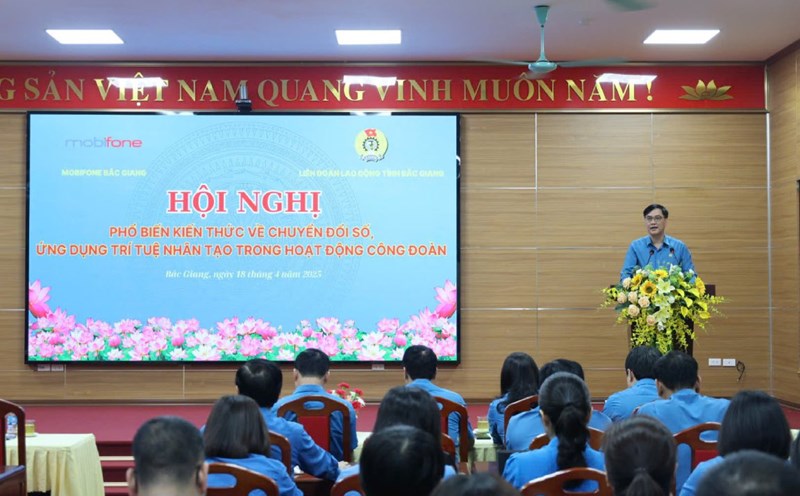Second Minister, how is artificial intelligence (AI) being applied in diagnosis, treatment and patient management at Vietnamese hospitals? What are the initial effectiveness of this application?

- The Ministry of Health has identified AI application as one of the key solutions to improve the capacity of the health system in the current digital transformation period.
Development practice shows that artificial intelligence (AI) has been increasingly applied in the medical field, especially in supporting diagnostic imaging, optimizing treatment regimens and improving hospital management efficiency. Some major hospitals have initially deployed AI in medical examination and treatment, bringing positive results.
In the field of diagnostic imaging, some central hospitals have deployed X-ray, CT, MRI reading support systems using AI, helping to detect lesions early and support doctors to make decisions faster. Some AI software to support cancer treatment has also been applied to personalize treatment regimens based on clinical data of patients.
In addition, AI is also applied in managing electronic medical records, helping to reduce administrative procedure loads, optimize hospital operations and improve patient experience. Some hospitals have integrated AI into remote medical examination and treatment systems, helping to improve the quality of treatment for people in remote areas.
Currently, 130 medical examination and treatment facilities have deployed electronic medical records, not using paper medical records; most have deployed non-cash payment services in many different forms such as bank transfer, QR code scanning, e-wallets, medical examination and treatment cards connected to banks.
In particular, the application of high technology has helped the health sector make great strides in lung transplantation and multi- organ transplantation for patients in 2024. Since the first organ transplant in 1992, more than 9,200 organ transplants have been performed. From 4 hospitals initially licensed for organ transplants by the Ministry of Health, up to now, there have been 28 hospitals that are qualified and licensed. The network of hospitals trained in organ donation and brain-dead assessment has expanded to 85 hospitals.
However, for AI to truly become an effective support tool in medical examination and treatment, there needs to be a complete legal corridor, ensuring data security and accuracy in application. The Ministry of Health has determined that in the coming time, it will focus on completing a system of legal documents on AI application in healthcare, ensuring the assessment and evaluation of AI quality before putting it into clinical application, while increasing training of medical human resources capable of using AI effectively.
Thus, the application of AI in healthcare is an inevitable trend, but there needs to be a cautious step, ensuring safety, effectiveness and suitability with the reality of the Vietnamese healthcare system.
What difficulties and challenges are the implementation of AI in healthcare facing, second minister?
- The deployment of AI in healthcare in Vietnam is facing many difficulties and challenges. First of all, there are limitations in data. Next is the problem of lack of high-quality human resources. I think there is a shortage of AI and healthcare experts, especially those who can combine professional knowledge in both fields. The problem of unsynchronized infrastructure is that many medical facilities - especially in remote areas - still lack the necessary equipment and information technology infrastructure to deploy AI.
We also raised legal and ethical issues when the legal framework for AI application in healthcare is not yet complete, especially issues related to data security, legal responsibility and ethics.
High investment costs are also a big challenge. Research, development and implementation of AI solutions in healthcare requires large investments, causing difficulties for many medical facilities.
How to ensure accuracy, safety and ethics when using AI in healthcare, especially in diagnosing and making treatment decisions?
- Deputy Minister Nguyen Tri Thuc: The application of artificial intelligence (AI) in healthcare brings many benefits, but also raises high requirements for accuracy, safety and ethics in the implementation process. The Ministry of Health clearly recognizes that AI does not replace doctors but is only a supporting tool, therefore, to ensure that AI application in healthcare is implemented in the right direction, it is necessary to focus on the following key contents:
First, perfect the system of legal documents regulating the application of AI in healthcare. The Ministry of Health will develop regulations on testing, licensing and monitoring of AI quality in medical examination and treatment, ensuring that only new standard AI systems are deployed in clinical practice.
Second, strengthen the protection of patient data. The application of AI in healthcare requires the processing of a large amount of personal data, therefore, the Ministry of Health will coordinate with relevant agencies to ensure that AI systems strictly comply with regulations on information security, avoiding the risk of personal data leakage.
Third, building ethical guidelines in the use of AI. Hospitals and medical facilities need to comply with the principle that AI only plays a role in supporting doctors, and cannot completely replace clinical decisions. All final treatment decisions must be supervised and confirmed by the doctor, ensuring professional responsibility and the rights of the patient.
The Ministry of Health will continue to research, evaluate and adjust policies related to AI in healthcare, ensuring that new technology solutions are applied effectively, safely, and in line with the Vietnamese healthcare system, while meeting ethical standards in medical examination and treatment.
It can be affirmed that at present, AI opens up a bright future for high-quality healthcare in Vietnam but will not completely replace the role of doctors and medical experts. AI will become a powerful support tool, helping to enhance diagnosis and treatment capabilities, thereby improving the quality of people's health care.











